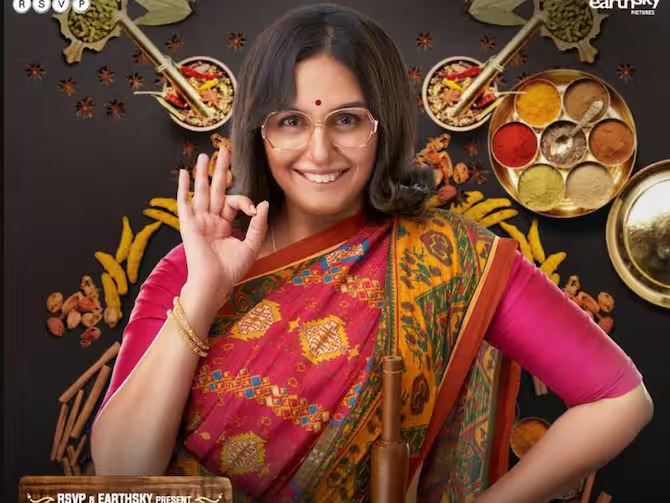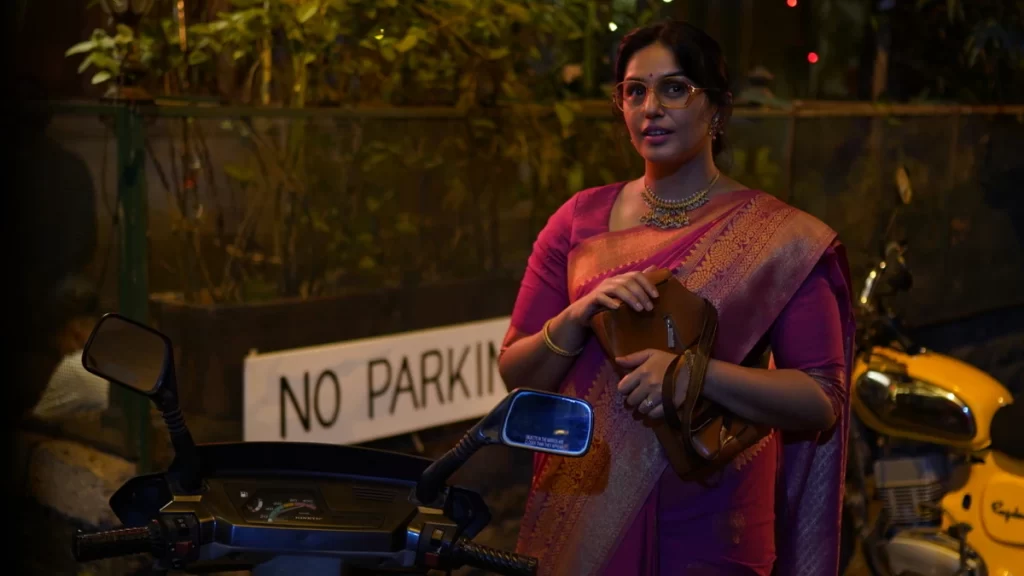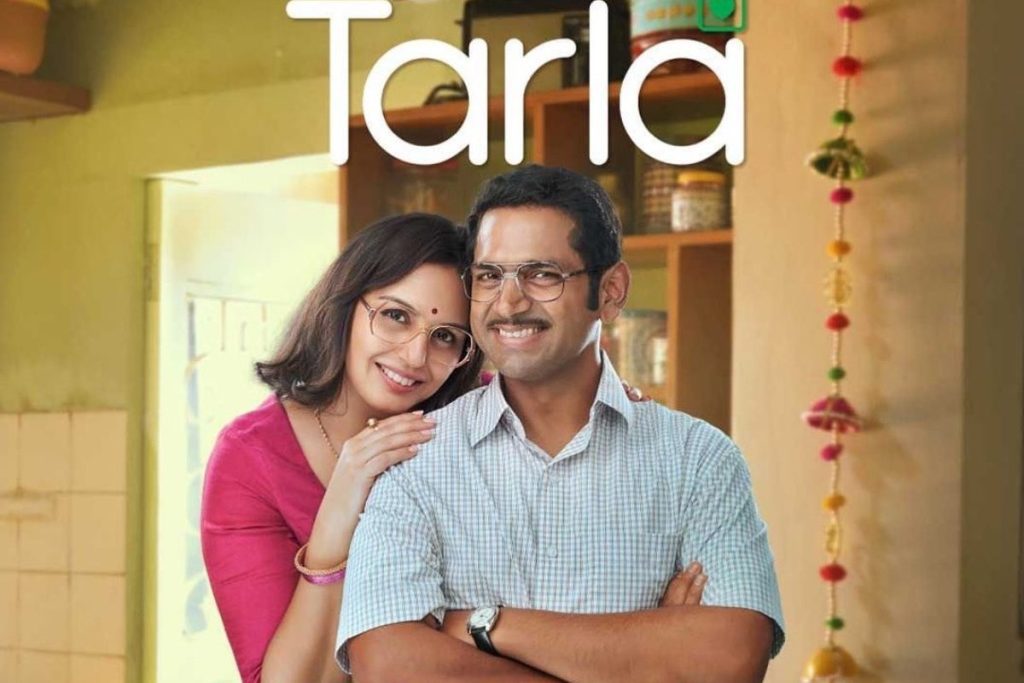
Tarla review: A culinary icon’s genius and journey gets half-baked treatment

If Hindi cinema routinely displays proof that it has very little idea about what to do with its women, it remains even more clueless of how to construct narratives that centre around female genius. These films often treat any kind of female excellence as incidental, something that miraculously appears out of thin air one fine day and not something that women spend days, perhaps decades, honing.
The odds are always stacked against these women and they remain more often than not, oblivious to their own natural talent. In that, these films are recognisable by their refusal to spend any time observing women derive pleasure from discovering their capabilities and instead, rush towards erroneously employing personal glory as an indication of a larger cultural reset.
A farcical commentary about female empowerment
Piyush Gupta’s Tarla, a biopic of eponymous culinary icon Tarla Dalal, treads this frustrating path of speaking on behalf of women rather than focusing itself on doing justice to the story of one woman. On paper, Tarla is meant to be an origin story that traces the almost impossible circumstances under which Dalal, a middle-class Gujarati homemaker, balanced an illustrious legacy as a vegetarian cookbook author, television host, and home chef.
Also read: Why films drop, humans tweet, mice guide and clouds hug information to themselves
But, on the screen, the film’s screenplay (Gupta and Gautam Ved are credited as co-writers) eschews any inquiry into Dalal’s inner life, flattening her story into a one-size-fits-all farcical commentary about female empowerment and agency. This is the kind of film whose only aim seems to be arriving at a rousing answer while neglecting every significant question on the way.
The beats of the story are as straightforward as it is simplistic: The film opens to an arranged marriage brokered between Tarla (Huma Qureshi), a college student with dreams of making a name for herself, and the mild-mannered Nalin Kumar (Sharib Hashmi), who promises to support her in the pursuit. A clever montage witnesses the years pass by as the couple build a home and family in Mumbai, settling comfortably in domestic monotony.

Still, the nagging feeling that she is neglecting her ambitions starts gnawing at Tarla as she approaches middle-age. It sets her off on a culinary journey that sees her running a finishing school where she teaches young women how to enjoy cooking, self-publish a cookbook that slowly gains readers, and ends at her transitioning into a much revered television cooking show host. In between, the guilt of familial neglect coupled with the pressures that domestic labour single-handedly inflicts on married women, threatens to pause her coming-of-age. It is as by-the-books as it can get.
Glaringly disinterested in food
I say this primarily because of the film’s glaring disinterest in food: for one, it doesn’t treat cooking as a skill, choosing to look at it rather as a woman’s duty. So we never quite get to know how Dalal honed her culinary skills or even, what prompted her down this route. It’s this approach that creates a distance between Dalal and the viewer, with the film never quite coming close to articulating the passion that Dalal holds for rustling up one dish after the other beyond the fact that as a mother of three, she is duty bound to feed her family.
Also read: Scoop review: Hansal Mehta’s subversive take shines light on journalism’s dark side
The absence is evident both visually and thematically — for a food film, Tarla barely possesses any noteworthy shots that visually brings alive the pleasures that can be derived from eating or cooking. Even the reasoning behind Dalal’s fascination with cooking plays into juvenile tropes — as per the film, she sees it as a way for women to win over their in-laws and by effect, patriarchy.
Throughout the film, the makers continue reiterating one claim: Dalal was someone who happened to just be really good at cooking, a theory that dilutes the possibility of any character development for the film’s protagonist and neglects the burden of domestic labour singlehandedly inflicted on generations of women.
In fact, the only standout moment in Tarla that truly focuses on the palpable power of food to satiate and delight is a comedic scene in which Dalal catches Nalin relishing a piece of mutton. The camera frames Hashmi in delirious ecstasy as he devours pieces of meat set as his betrayed wife looks on. That over a bloated two hours, Tarla can come up with no comparable sequence centering the vegetarian food made by Dalal is telling of its own failings.
Bland replication of a tastemaker’s life
The real-life Dalal was famous for experimenting with non-vegetarian recipes from around the world and coming up with their vegetarian counterparts in a way that didn’t just make cooking easy but also interesting for her Indian audience. Even here, Tarla fails in its understanding of vegetarian cuisine, reducing her culinary ingenuity into a vapid substitution exercise and continuing Hindi cinema’s failure at envisioning a compelling food film.

The unimaginative design of the film goes beyond its weak writing and storytelling — the casting for instance, is suspect. Qureshi is visibly miscast as Dalal, her inconsistent and theatrical pitching reducing the character to a caricature of a damsel-in-distress. The actor’s performance is devoid of any personality or nuance that on more than one occasion, I found myself daydreaming what Vidya Balan could have brought to the role.
Also read: Kathal review: A satirical commentary on India’s politics, police and the press
A lot of that can really be zeroed down to the film suffering from a debut director problem. By which I mean, Gupta seems unsure of his own craft, displaying a tendency to heighten up the theatrics in order to substitute for worldbuilding. For one, the film has no sense of time or place, painting the outlines of a conservative society as a stereotype.
After a point, the screenplay conveniently altering real-life events to drum up sympathy for the obstacles that Dalal was forced to face starts feeling like a cheap device. Mostly because it undermines the integrity of its central protagonist, a flaw that I’d imagine even the most well-meaning biopic cannot really recover from.
The result is a film that is half-baked and misguided, one that is middling both as a coming-of-age tale or and an entrepreneurial success story. In fact, I’d be more inclined to take Tarla’s overt preaching of feminism seriously if the makers had paused to reflect on Tarla Dalal’s life instead of blandly replicating its highlights on screen.
Tarla is streaming on Zee5

